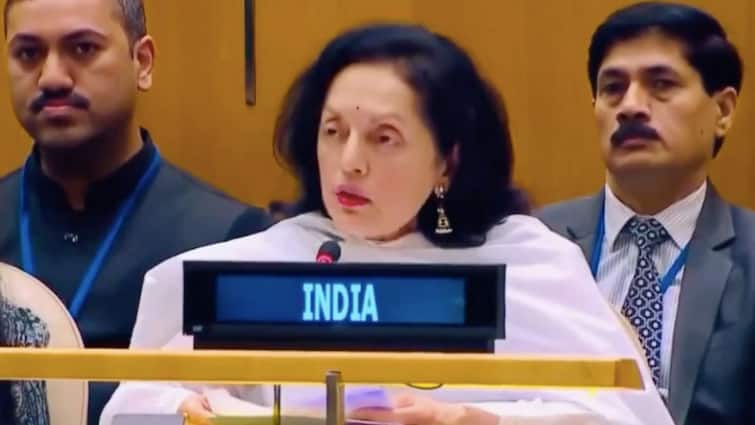India chose to abstain from voting on a draft resolution presented by Pakistan and co-sponsored by China on Islamophobia in the UN General Assembly (UNGA), advocating for acknowledgment of religiophobia directed towards Hinduism, Buddhism, Sikhism, and other faiths instead of singling out one religion, news agency PTI reported.
The resolution, titled ‘Measures to combat Islamophobia,’ was introduced by Pakistan and adopted by the 193-member UNGA, with 115 nations voting in favor, none against, and 44 abstentions, including India, Brazil, France, Germany, Italy, Ukraine, and the UK.
According to PTI, India’s Permanent Representative to the UN, Ambassador Ruchira Kamboj, condemned acts motivated by anti-Semitism, Christianophobia, and Islamophobia but pointed out the need to recognise that such phobias extend beyond Abrahamic religions.
“Clear evidence shows that over the years, followers of non-Abrahamic religions have also been affected by religiophobia. This has resulted in the emergence of modern forms of religiophobia, particularly anti-Hindu, anti-Buddhist, and anti-Sikh sentiments,” Kamboj, was quoted by PTI as saying.
The Indian diplomat stated that the resolution’s adoption should not set a precedent that could lead to numerous resolutions centred on phobias associated with specific religions, “potentially dividing the United Nations into religious camps.”
“It is crucial for the UN to maintain its stance above such religious concerns, which have the potential to fragment us rather than unite us under the banner of peace and harmony, embracing the world as one global family,” she went on to say.
India urged all member states to consider the broader scope of religious discrimination that exists worldwide.
“While the issue of Islamophobia is undeniably important, we must recognise that other religions face discrimination and violence. Allocating resources solely to combat Islamophobia, while ignoring similar challenges faced by other faiths, may unintentionally perpetuate a sense of exclusion and inequality,” Kamboj stated.
She told the United Nations General Assembly that “it is crucial to recognise” that Hinduism, with over 1.2 billion followers, Buddhism, with over 535 million, and Sikhism, with over 30 million followers worldwide, are all subject to religiophobia.
“It is time that we acknowledge the prevalence of religiophobia, rather than single out just one,” she went on to say.
“The destruction of the Bamiyan Buddhas, violations of gurudwara premises, massacres of Sikh pilgrims in gurudwaras, attacks on temples, and the glorification of breaking idols in temples all contribute to the rise of contemporary forms of religiophobia against non-Abrahamic religions,” she added further.
India chose to abstain from voting on a draft resolution presented by Pakistan and co-sponsored by China on Islamophobia in the UN General Assembly (UNGA), advocating for acknowledgment of religiophobia directed towards Hinduism, Buddhism, Sikhism, and other faiths instead of singling out one religion, news agency PTI reported.
The resolution, titled ‘Measures to combat Islamophobia,’ was introduced by Pakistan and adopted by the 193-member UNGA, with 115 nations voting in favor, none against, and 44 abstentions, including India, Brazil, France, Germany, Italy, Ukraine, and the UK.
According to PTI, India’s Permanent Representative to the UN, Ambassador Ruchira Kamboj, condemned acts motivated by anti-Semitism, Christianophobia, and Islamophobia but pointed out the need to recognise that such phobias extend beyond Abrahamic religions.
“Clear evidence shows that over the years, followers of non-Abrahamic religions have also been affected by religiophobia. This has resulted in the emergence of modern forms of religiophobia, particularly anti-Hindu, anti-Buddhist, and anti-Sikh sentiments,” Kamboj, was quoted by PTI as saying.
The Indian diplomat stated that the resolution’s adoption should not set a precedent that could lead to numerous resolutions centred on phobias associated with specific religions, “potentially dividing the United Nations into religious camps.”
“It is crucial for the UN to maintain its stance above such religious concerns, which have the potential to fragment us rather than unite us under the banner of peace and harmony, embracing the world as one global family,” she went on to say.
India urged all member states to consider the broader scope of religious discrimination that exists worldwide.
“While the issue of Islamophobia is undeniably important, we must recognise that other religions face discrimination and violence. Allocating resources solely to combat Islamophobia, while ignoring similar challenges faced by other faiths, may unintentionally perpetuate a sense of exclusion and inequality,” Kamboj stated.
She told the United Nations General Assembly that “it is crucial to recognise” that Hinduism, with over 1.2 billion followers, Buddhism, with over 535 million, and Sikhism, with over 30 million followers worldwide, are all subject to religiophobia.
“It is time that we acknowledge the prevalence of religiophobia, rather than single out just one,” she went on to say.
“The destruction of the Bamiyan Buddhas, violations of gurudwara premises, massacres of Sikh pilgrims in gurudwaras, attacks on temples, and the glorification of breaking idols in temples all contribute to the rise of contemporary forms of religiophobia against non-Abrahamic religions,” she added further.
India chose to abstain from voting on a draft resolution presented by Pakistan and co-sponsored by China on Islamophobia in the UN General Assembly (UNGA), advocating for acknowledgment of religiophobia directed towards Hinduism, Buddhism, Sikhism, and other faiths instead of singling out one religion, news agency PTI reported.
The resolution, titled ‘Measures to combat Islamophobia,’ was introduced by Pakistan and adopted by the 193-member UNGA, with 115 nations voting in favor, none against, and 44 abstentions, including India, Brazil, France, Germany, Italy, Ukraine, and the UK.
According to PTI, India’s Permanent Representative to the UN, Ambassador Ruchira Kamboj, condemned acts motivated by anti-Semitism, Christianophobia, and Islamophobia but pointed out the need to recognise that such phobias extend beyond Abrahamic religions.
“Clear evidence shows that over the years, followers of non-Abrahamic religions have also been affected by religiophobia. This has resulted in the emergence of modern forms of religiophobia, particularly anti-Hindu, anti-Buddhist, and anti-Sikh sentiments,” Kamboj, was quoted by PTI as saying.
The Indian diplomat stated that the resolution’s adoption should not set a precedent that could lead to numerous resolutions centred on phobias associated with specific religions, “potentially dividing the United Nations into religious camps.”
“It is crucial for the UN to maintain its stance above such religious concerns, which have the potential to fragment us rather than unite us under the banner of peace and harmony, embracing the world as one global family,” she went on to say.
India urged all member states to consider the broader scope of religious discrimination that exists worldwide.
“While the issue of Islamophobia is undeniably important, we must recognise that other religions face discrimination and violence. Allocating resources solely to combat Islamophobia, while ignoring similar challenges faced by other faiths, may unintentionally perpetuate a sense of exclusion and inequality,” Kamboj stated.
She told the United Nations General Assembly that “it is crucial to recognise” that Hinduism, with over 1.2 billion followers, Buddhism, with over 535 million, and Sikhism, with over 30 million followers worldwide, are all subject to religiophobia.
“It is time that we acknowledge the prevalence of religiophobia, rather than single out just one,” she went on to say.
“The destruction of the Bamiyan Buddhas, violations of gurudwara premises, massacres of Sikh pilgrims in gurudwaras, attacks on temples, and the glorification of breaking idols in temples all contribute to the rise of contemporary forms of religiophobia against non-Abrahamic religions,” she added further.
India chose to abstain from voting on a draft resolution presented by Pakistan and co-sponsored by China on Islamophobia in the UN General Assembly (UNGA), advocating for acknowledgment of religiophobia directed towards Hinduism, Buddhism, Sikhism, and other faiths instead of singling out one religion, news agency PTI reported.
The resolution, titled ‘Measures to combat Islamophobia,’ was introduced by Pakistan and adopted by the 193-member UNGA, with 115 nations voting in favor, none against, and 44 abstentions, including India, Brazil, France, Germany, Italy, Ukraine, and the UK.
According to PTI, India’s Permanent Representative to the UN, Ambassador Ruchira Kamboj, condemned acts motivated by anti-Semitism, Christianophobia, and Islamophobia but pointed out the need to recognise that such phobias extend beyond Abrahamic religions.
“Clear evidence shows that over the years, followers of non-Abrahamic religions have also been affected by religiophobia. This has resulted in the emergence of modern forms of religiophobia, particularly anti-Hindu, anti-Buddhist, and anti-Sikh sentiments,” Kamboj, was quoted by PTI as saying.
The Indian diplomat stated that the resolution’s adoption should not set a precedent that could lead to numerous resolutions centred on phobias associated with specific religions, “potentially dividing the United Nations into religious camps.”
“It is crucial for the UN to maintain its stance above such religious concerns, which have the potential to fragment us rather than unite us under the banner of peace and harmony, embracing the world as one global family,” she went on to say.
India urged all member states to consider the broader scope of religious discrimination that exists worldwide.
“While the issue of Islamophobia is undeniably important, we must recognise that other religions face discrimination and violence. Allocating resources solely to combat Islamophobia, while ignoring similar challenges faced by other faiths, may unintentionally perpetuate a sense of exclusion and inequality,” Kamboj stated.
She told the United Nations General Assembly that “it is crucial to recognise” that Hinduism, with over 1.2 billion followers, Buddhism, with over 535 million, and Sikhism, with over 30 million followers worldwide, are all subject to religiophobia.
“It is time that we acknowledge the prevalence of religiophobia, rather than single out just one,” she went on to say.
“The destruction of the Bamiyan Buddhas, violations of gurudwara premises, massacres of Sikh pilgrims in gurudwaras, attacks on temples, and the glorification of breaking idols in temples all contribute to the rise of contemporary forms of religiophobia against non-Abrahamic religions,” she added further.
India chose to abstain from voting on a draft resolution presented by Pakistan and co-sponsored by China on Islamophobia in the UN General Assembly (UNGA), advocating for acknowledgment of religiophobia directed towards Hinduism, Buddhism, Sikhism, and other faiths instead of singling out one religion, news agency PTI reported.
The resolution, titled ‘Measures to combat Islamophobia,’ was introduced by Pakistan and adopted by the 193-member UNGA, with 115 nations voting in favor, none against, and 44 abstentions, including India, Brazil, France, Germany, Italy, Ukraine, and the UK.
According to PTI, India’s Permanent Representative to the UN, Ambassador Ruchira Kamboj, condemned acts motivated by anti-Semitism, Christianophobia, and Islamophobia but pointed out the need to recognise that such phobias extend beyond Abrahamic religions.
“Clear evidence shows that over the years, followers of non-Abrahamic religions have also been affected by religiophobia. This has resulted in the emergence of modern forms of religiophobia, particularly anti-Hindu, anti-Buddhist, and anti-Sikh sentiments,” Kamboj, was quoted by PTI as saying.
The Indian diplomat stated that the resolution’s adoption should not set a precedent that could lead to numerous resolutions centred on phobias associated with specific religions, “potentially dividing the United Nations into religious camps.”
“It is crucial for the UN to maintain its stance above such religious concerns, which have the potential to fragment us rather than unite us under the banner of peace and harmony, embracing the world as one global family,” she went on to say.
India urged all member states to consider the broader scope of religious discrimination that exists worldwide.
“While the issue of Islamophobia is undeniably important, we must recognise that other religions face discrimination and violence. Allocating resources solely to combat Islamophobia, while ignoring similar challenges faced by other faiths, may unintentionally perpetuate a sense of exclusion and inequality,” Kamboj stated.
She told the United Nations General Assembly that “it is crucial to recognise” that Hinduism, with over 1.2 billion followers, Buddhism, with over 535 million, and Sikhism, with over 30 million followers worldwide, are all subject to religiophobia.
“It is time that we acknowledge the prevalence of religiophobia, rather than single out just one,” she went on to say.
“The destruction of the Bamiyan Buddhas, violations of gurudwara premises, massacres of Sikh pilgrims in gurudwaras, attacks on temples, and the glorification of breaking idols in temples all contribute to the rise of contemporary forms of religiophobia against non-Abrahamic religions,” she added further.
India chose to abstain from voting on a draft resolution presented by Pakistan and co-sponsored by China on Islamophobia in the UN General Assembly (UNGA), advocating for acknowledgment of religiophobia directed towards Hinduism, Buddhism, Sikhism, and other faiths instead of singling out one religion, news agency PTI reported.
The resolution, titled ‘Measures to combat Islamophobia,’ was introduced by Pakistan and adopted by the 193-member UNGA, with 115 nations voting in favor, none against, and 44 abstentions, including India, Brazil, France, Germany, Italy, Ukraine, and the UK.
According to PTI, India’s Permanent Representative to the UN, Ambassador Ruchira Kamboj, condemned acts motivated by anti-Semitism, Christianophobia, and Islamophobia but pointed out the need to recognise that such phobias extend beyond Abrahamic religions.
“Clear evidence shows that over the years, followers of non-Abrahamic religions have also been affected by religiophobia. This has resulted in the emergence of modern forms of religiophobia, particularly anti-Hindu, anti-Buddhist, and anti-Sikh sentiments,” Kamboj, was quoted by PTI as saying.
The Indian diplomat stated that the resolution’s adoption should not set a precedent that could lead to numerous resolutions centred on phobias associated with specific religions, “potentially dividing the United Nations into religious camps.”
“It is crucial for the UN to maintain its stance above such religious concerns, which have the potential to fragment us rather than unite us under the banner of peace and harmony, embracing the world as one global family,” she went on to say.
India urged all member states to consider the broader scope of religious discrimination that exists worldwide.
“While the issue of Islamophobia is undeniably important, we must recognise that other religions face discrimination and violence. Allocating resources solely to combat Islamophobia, while ignoring similar challenges faced by other faiths, may unintentionally perpetuate a sense of exclusion and inequality,” Kamboj stated.
She told the United Nations General Assembly that “it is crucial to recognise” that Hinduism, with over 1.2 billion followers, Buddhism, with over 535 million, and Sikhism, with over 30 million followers worldwide, are all subject to religiophobia.
“It is time that we acknowledge the prevalence of religiophobia, rather than single out just one,” she went on to say.
“The destruction of the Bamiyan Buddhas, violations of gurudwara premises, massacres of Sikh pilgrims in gurudwaras, attacks on temples, and the glorification of breaking idols in temples all contribute to the rise of contemporary forms of religiophobia against non-Abrahamic religions,” she added further.
India chose to abstain from voting on a draft resolution presented by Pakistan and co-sponsored by China on Islamophobia in the UN General Assembly (UNGA), advocating for acknowledgment of religiophobia directed towards Hinduism, Buddhism, Sikhism, and other faiths instead of singling out one religion, news agency PTI reported.
The resolution, titled ‘Measures to combat Islamophobia,’ was introduced by Pakistan and adopted by the 193-member UNGA, with 115 nations voting in favor, none against, and 44 abstentions, including India, Brazil, France, Germany, Italy, Ukraine, and the UK.
According to PTI, India’s Permanent Representative to the UN, Ambassador Ruchira Kamboj, condemned acts motivated by anti-Semitism, Christianophobia, and Islamophobia but pointed out the need to recognise that such phobias extend beyond Abrahamic religions.
“Clear evidence shows that over the years, followers of non-Abrahamic religions have also been affected by religiophobia. This has resulted in the emergence of modern forms of religiophobia, particularly anti-Hindu, anti-Buddhist, and anti-Sikh sentiments,” Kamboj, was quoted by PTI as saying.
The Indian diplomat stated that the resolution’s adoption should not set a precedent that could lead to numerous resolutions centred on phobias associated with specific religions, “potentially dividing the United Nations into religious camps.”
“It is crucial for the UN to maintain its stance above such religious concerns, which have the potential to fragment us rather than unite us under the banner of peace and harmony, embracing the world as one global family,” she went on to say.
India urged all member states to consider the broader scope of religious discrimination that exists worldwide.
“While the issue of Islamophobia is undeniably important, we must recognise that other religions face discrimination and violence. Allocating resources solely to combat Islamophobia, while ignoring similar challenges faced by other faiths, may unintentionally perpetuate a sense of exclusion and inequality,” Kamboj stated.
She told the United Nations General Assembly that “it is crucial to recognise” that Hinduism, with over 1.2 billion followers, Buddhism, with over 535 million, and Sikhism, with over 30 million followers worldwide, are all subject to religiophobia.
“It is time that we acknowledge the prevalence of religiophobia, rather than single out just one,” she went on to say.
“The destruction of the Bamiyan Buddhas, violations of gurudwara premises, massacres of Sikh pilgrims in gurudwaras, attacks on temples, and the glorification of breaking idols in temples all contribute to the rise of contemporary forms of religiophobia against non-Abrahamic religions,” she added further.
India chose to abstain from voting on a draft resolution presented by Pakistan and co-sponsored by China on Islamophobia in the UN General Assembly (UNGA), advocating for acknowledgment of religiophobia directed towards Hinduism, Buddhism, Sikhism, and other faiths instead of singling out one religion, news agency PTI reported.
The resolution, titled ‘Measures to combat Islamophobia,’ was introduced by Pakistan and adopted by the 193-member UNGA, with 115 nations voting in favor, none against, and 44 abstentions, including India, Brazil, France, Germany, Italy, Ukraine, and the UK.
According to PTI, India’s Permanent Representative to the UN, Ambassador Ruchira Kamboj, condemned acts motivated by anti-Semitism, Christianophobia, and Islamophobia but pointed out the need to recognise that such phobias extend beyond Abrahamic religions.
“Clear evidence shows that over the years, followers of non-Abrahamic religions have also been affected by religiophobia. This has resulted in the emergence of modern forms of religiophobia, particularly anti-Hindu, anti-Buddhist, and anti-Sikh sentiments,” Kamboj, was quoted by PTI as saying.
The Indian diplomat stated that the resolution’s adoption should not set a precedent that could lead to numerous resolutions centred on phobias associated with specific religions, “potentially dividing the United Nations into religious camps.”
“It is crucial for the UN to maintain its stance above such religious concerns, which have the potential to fragment us rather than unite us under the banner of peace and harmony, embracing the world as one global family,” she went on to say.
India urged all member states to consider the broader scope of religious discrimination that exists worldwide.
“While the issue of Islamophobia is undeniably important, we must recognise that other religions face discrimination and violence. Allocating resources solely to combat Islamophobia, while ignoring similar challenges faced by other faiths, may unintentionally perpetuate a sense of exclusion and inequality,” Kamboj stated.
She told the United Nations General Assembly that “it is crucial to recognise” that Hinduism, with over 1.2 billion followers, Buddhism, with over 535 million, and Sikhism, with over 30 million followers worldwide, are all subject to religiophobia.
“It is time that we acknowledge the prevalence of religiophobia, rather than single out just one,” she went on to say.
“The destruction of the Bamiyan Buddhas, violations of gurudwara premises, massacres of Sikh pilgrims in gurudwaras, attacks on temples, and the glorification of breaking idols in temples all contribute to the rise of contemporary forms of religiophobia against non-Abrahamic religions,” she added further.








